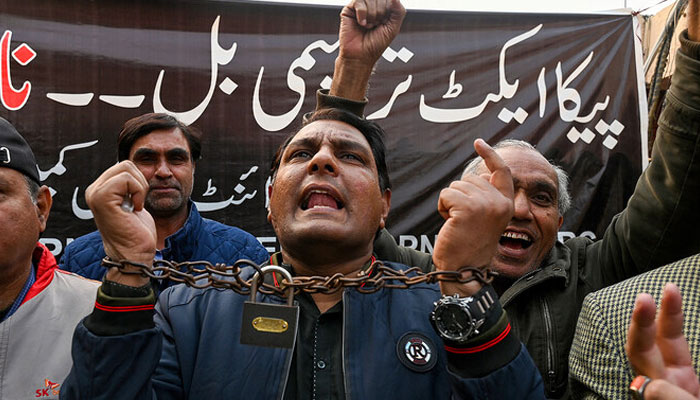KPC ‘Azadi Convention’ demands immediate repeal of ‘draconian Peca’
Journalist bodies, politicians, lawyers, and human rights organisations on Saturday vowed to continue their struggle within the legal and democratic framework against the controversial amendments to the Prevention of Electronic Crimes Act (Peca).
They declared that by introducing this draconian law, the government has admitted that it now views journalism and journalists as criminals and will take retaliatory actions against them.
They said Peca was a black law that should be immediately repealed as it provided legal cover to illegal and unethical actions.
The Karachi Press Club hosted the "Azadi Convention" to advocate for the freedom of press, democracy, politics, and the judiciary.
The event was addressed by KPC President Fazil Jamili, Secretary Sohail Afzal Khan, senior journalist Mazhar Abbas, senior politician Raza Rabbani, Pakistan Tehreek-e-Insaf Sindh President Haleem Adil Sheikh, legal expert Barrister Salahuddin Ahmed, ANP Sindh General Secretary Younas Buneri, Pakistan Muslim League-Functional's Sahar Bano, Karachi Bar Association General Secretary GM Korai, labour leader Nasir Mansoor, and Karachi University Teachers Society Secretary Professor Maroof bin Rauf.
Also present at the event were KPC treasurer Imran Ayub, joint secretary Muhammad Munsif, governing body member Abdul Hafeez Baloch, Karachi Union of Journalists (Dastoor) President Abdul Rehman, and a large number of other journalists.
During their speeches, the speakers rejected Peca and demanded that the government immediately abolish all restrictions and tactics curbing freedom of expression. They called for an end to retaliatory actions against working journalists and media houses under the guise of combating fake news. The speakers reiterated that Peca was a draconian law that should be annulled without delay as it legitimizes unlawful and unethical measures.
They announced the launch of a protest movement against Peca, stating that the journalist community, civil society, and all democratic forces would continue their struggle within the legal and democratic framework until this and similar laws were repealed. They expressed concern that this black law targets political parties, journalists, lawyers, doctors, laborers, social workers, students, and teachers, emphasizing that it is alarming that some political parties have compromised on their principles, creating space for undemocratic forces.
The speakers further stated that before the passage of Peca, power-intoxicated authorities had been suppressing journalists, doctors, lawyers, students, teachers, and poets for expressing their views. They also urged media owners and media houses to ensure timely salary payments to employees, immediately stop forced layoffs, and clear outstanding dues.
Additionally, they demanded that all media houses provide medical facilities for their employees. The speakers warned media owners that if they did not change their anti-worker policies, the Press Club, along with the entire journalist community, would launch a well-organized movement against them.
-
 Prince William Questions Himself ‘what’s The Point’ After Saudi Trip
Prince William Questions Himself ‘what’s The Point’ After Saudi Trip -
 James Van Der Beek's Friends Helped Fund Ranch Purchase Before His Death At 48
James Van Der Beek's Friends Helped Fund Ranch Purchase Before His Death At 48 -
 King Charles ‘very Much’ Wants Andrew To Testify At US Congress
King Charles ‘very Much’ Wants Andrew To Testify At US Congress -
 Rosie O’Donnell Secretly Returned To US To Test Safety
Rosie O’Donnell Secretly Returned To US To Test Safety -
 Meghan Markle, Prince Harry Spotted On Date Night On Valentine’s Day
Meghan Markle, Prince Harry Spotted On Date Night On Valentine’s Day -
 King Charles Butler Spills Valentine’s Day Dinner Blunders
King Charles Butler Spills Valentine’s Day Dinner Blunders -
 Brooklyn Beckham Hits Back At Gordon Ramsay With Subtle Move Over Remark On His Personal Life
Brooklyn Beckham Hits Back At Gordon Ramsay With Subtle Move Over Remark On His Personal Life -
 Meghan Markle Showcases Princess Lilibet Face On Valentine’s Day
Meghan Markle Showcases Princess Lilibet Face On Valentine’s Day -
 Harry Styles Opens Up About Isolation After One Direction Split
Harry Styles Opens Up About Isolation After One Direction Split -
 Shamed Andrew Was ‘face To Face’ With Epstein Files, Mocked For Lying
Shamed Andrew Was ‘face To Face’ With Epstein Files, Mocked For Lying -
 Kanye West Projected To Explode Music Charts With 'Bully' After He Apologized Over Antisemitism
Kanye West Projected To Explode Music Charts With 'Bully' After He Apologized Over Antisemitism -
 Leighton Meester Reflects On How Valentine’s Day Feels Like Now
Leighton Meester Reflects On How Valentine’s Day Feels Like Now -
 Sarah Ferguson ‘won’t Let Go Without A Fight’ After Royal Exile
Sarah Ferguson ‘won’t Let Go Without A Fight’ After Royal Exile -
 Adam Sandler Makes Brutal Confession: 'I Do Not Love Comedy First'
Adam Sandler Makes Brutal Confession: 'I Do Not Love Comedy First' -
 'Harry Potter' Star Rupert Grint Shares Where He Stands Politically
'Harry Potter' Star Rupert Grint Shares Where He Stands Politically -
 Drama Outside Nancy Guthrie's Home Unfolds Described As 'circus'
Drama Outside Nancy Guthrie's Home Unfolds Described As 'circus'




